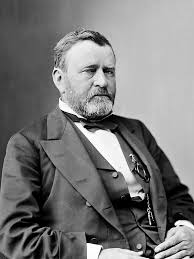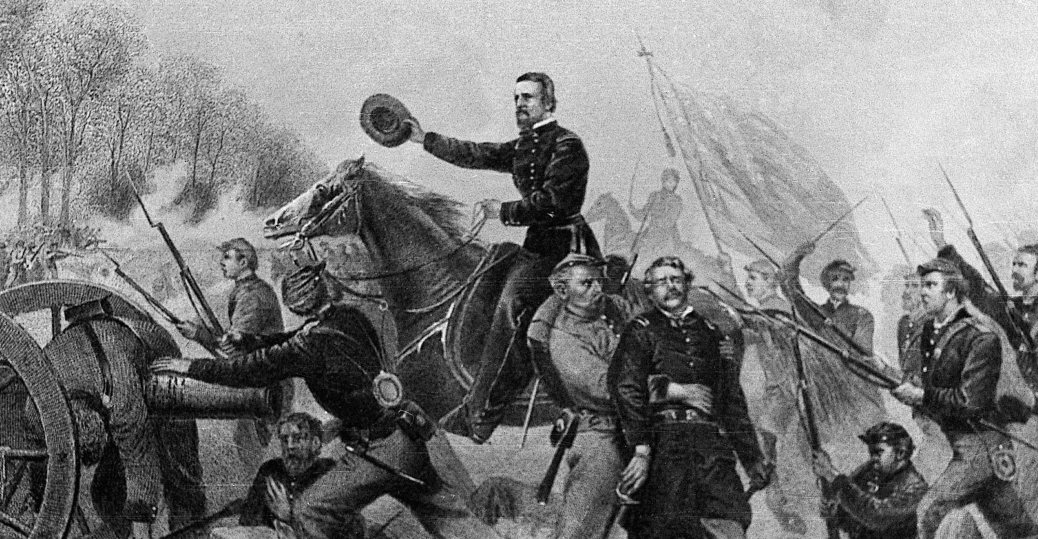Ulysses S. Grant commanded the Union army during the American Civil War and served as the 18th U.S. president from 1869 to 1877. An Ohio native, Grant graduated from West Point and fought in the Mexican-American War. During the Civil War, Grant, an aggressive and determined leader, was given command of all the U.S. armies.
“The art of war is simple enough. Find out where your enemy is. Get at him as soon as you can. Strike him as hard as you can, and keep moving on.” – U. S. Grant
Grant achieved fame by winning the Civil War as the its commanding general. He then served in Washington was the acting Secretary of War and people starting urging him to run for President. There were no other strong candidates, so Grant agreed to run and won easily for two terms. Grant was a good general because he wouldn’t give up. If one thing didn’t work he’d try another, if that plan went wrong he’d improvise until it worked, and he always kept moving and attacking. Historians don’t usually say he was a ‘great’ general, because using the above methods he made a lot of mistakes, his casualties were high, but he won because he kept trying and kept correcting his mistakes and didn’t get discouraged.
In the world of an army at war where Grant could call the shots, he excelled, because in an army at war, victory in the face of the enemy is the only motto that matters. The one accomplishment that cannot be diminished or gossiped away. A great general but not a great president. But he was a better president than the one immediately before and those for a while after him. His intentions and statesmanship ideas were good, but his way of dealing with politics showed his lack of experience. .
After the war he became a national hero, and the Republicans nominated him for president in 1868. A primary focus of Grant’s administration was Reconstruction, and he worked to reconcile the North and South while also attempting to protect the civil rights of newly freed black slaves. While Grant was personally honest, some of his associates were corrupt and his administration was tarnished by various scandals. After retiring, Grant invested in a brokerage firm that went bankrupt, costing him his life savings. He spent his final days penning his memoirs, which were published the year he died and proved a critical and financial success. After the Civil War began in April 1861, Grant became a colonel of the 21st Illinois Volunteers. Later that summer, President Abraham Lincoln made Grant a brigadier general. Grant’s first major victory came in February 1862, when his troops captured Fort Donelson in Tenness ee. When the Confederate general in charge of the fort asked about terms of surrender, Grant famously replied, “No terms except an unconditional and immediate surrender can be accepted.”
ee. When the Confederate general in charge of the fort asked about terms of surrender, Grant famously replied, “No terms except an unconditional and immediate surrender can be accepted.”
In July 1863, Grant’s forces captured Vicksburg, Mississippi, a Confederate stronghold. Grant, who was earning a reputation as a determined leader, was appointed lieutenant general by Lincoln in March 1864 and given command of all U.S. armies. On April 9, 1865, Confederate General Robert Lee surrendered to Grant at Appomattox Court House in Virginia, effectively ending the Civil War. The Republicans nominated Grant as their presidential candidate, selecting Schuyler Colfax, a U.S. congressman from Indiana, as his running mate. The Democrats chose former New York governor Horatio Seymour as their presidential nominee, paired with Francis Blair, a U.S. congressman from Missouri. At age 46, he became the youngest president-elect in U.S. Grant became known for appointing people who were not of good character. While he had some success during his time in office, including pushing through ratification of the 15th Amendment and establishing the National Parks Service, his administration’s scandals rocked both of his presidential terms, and he didn’t get the opportunity to serve a third.
Grant began selling short magazine articles about his life and then negotiated a contract with a friend, novelist Mark Twain, to publish his memoirs. The two-volume set went on to sell some 300,000 copies, becoming a classic work of American literature. Ultimately, the work earned Grant’s family nearly $450,000. Ulysses S. Grant died on July 23, 1885, just as his memoirs were being published, at the age of 63, in Mount McGregor, New York. He is buried in New York City. He was the top general during the Civil War and while he had many personal faults such as alcoholic abuse and domestic affairs, Lincoln knew he was the man to hold the union together. Grant showed persistence and patience at the siege of Vicksburg and the overland campaign, including the battle of the wilderness.
Ulysses S Grant was a better general than a president because he wouldn’t give up. If one thing didn’t work he’d try another, if that plan went wrong he’d improvise until it worked, and he always kept moving and attacking.
http://www.historynet.com/ulysses-s-grant
http://www.brainyquote.com/quotes/authors/u/ulysses_s_grant.html

